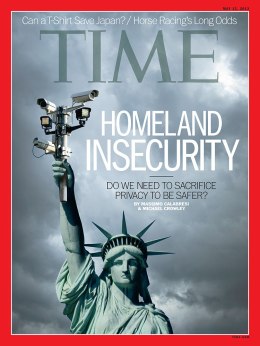
In fact, if there was any interagency problem this time around, it may have been oversharing. After the Russians flagged Tamerlan as a concern in the spring of 2011, U.S. officials put his name on the National Counterterrorism Center’s Terrorist Identities Datamart Environment list (TIDE). Nominally a clearinghouse for names of possible or suspected terrorists, the TIDE list has become more of an interagency dumping ground. With more than 740,000 names, it is rarely consulted or monitored by U.S. investigators.
The harder question raised by the Tsarnaev case is how deep into his private life investigators would have had to go in order to piece together the brothers’ plot. America redrew the boundaries between privacy and security in the years after 9/11. Rather than create a powerful new domestic intelligence agency, like those in Canada and the U.K., the U.S. decided to give the FBI increased powers. That meant entirely new rules for domestic counterterrorism investigations, which were unveiled in 2008 under George W. Bush’s last Attorney General, Michael Mukasey. The rules broke down the divide between strictly criminal and more wide-ranging national-security investigations, allowing FBI agents to hunt terrorists with all the authority available to both criminal and national-security officials. They also granted the FBI the power to investigate more aggressively and pre-emptively, allowing for action even on the basis of thin evidence, with the goal of breaking up terrorist plots before their execution. It was a little noticed but significant change in the way the FBI did business.
(MORE: Tsarnaev Neighbors: Older Bombing Suspect Spent Time in Dagestan Helping Dad With Construction)
After a 2008 presidential campaign in which he vowed to hunt down al-Qaeda leaders overseas, Barack Obama took office having said little about domestic terrorism. He soon found that the threat at home was growing. Where authorities had identified a total of 21 homegrown jihadist-inspired terrorist plots and two attacks in the eight years after 9/11, U.S. law enforcement made 42 arrests from May 2009 to December 2012. Those arrested included Faisal Shahzad, whose SUV bomb nearly exploded on a Saturday night in New York City’s Times Square, and Army major Nidal Hasan, who allegedly killed 13 people in a November 2009 shooting rampage at Fort Hood in Texas. When the Administration issued its new FBI guidelines in 2011, it expanded many of the bureau’s terrorist-hunting powers.
But it cranked others back. The Obama team’s core strategy for rooting out homegrown Muslim extremists was to gain the trust of Muslim communities. The White House created a new position on its National Security Council staff for Quintan Wiktorowicz, an expert on Muslim radicalization, who has interviewed hundreds of Islamists in Europe. A top aide, Denis McDonough, visited a Virginia mosque in 2011 to promote the strategy. “The most effective voices against al-Qaeda’s warped worldview and interpretation of Islam are other Muslims,” McDonough, now Obama’s chief of staff, said.
This attitude helped inform the 2011 investigative guidelines. So, perhaps, did Muslim-American anger over alleged ethnic and religious profiling. Earlier that year, for instance, the ACLU and the Council on American-Islamic Relations sued the FBI for violating the civil rights of Muslims in Southern California by hiring an undercover agent to infiltrate mosques there and conduct what the plaintiffs claimed was “indiscriminate surveillance.” Under the new guidelines, an agent wanting to “identify, obtain and utilize information about actual or potential national security threats” in a mosque showing he had a specific reason to believe something untoward was happening there had to get approval from the special agent in charge of his region. And if agents wanted to go in undercover, they’d have to get permission from the newly created SORC, the special committee in Washington. Most of the details of the SORC remain classified, including the names of its chair, members and staff, its process for reviewing requests and overseeing investigations and its ability to issue emergency authorizations.
(MORE: The Boston-Bomber Trail: Fresh Clues in Rural Dagestan)
These new authorities came into effect only after the FBI checked out Tamerlan in the spring and early summer of 2011. In that assessment, the FBI didn’t conduct surveillance on Tamerlan, scour the trash of potential sources or interview those who knew him without identifying themselves as fed, according to a senior law-enforcement official familiar with the investigation. Had they pushed harder and turned up troubling evidence, they might have won permission to wiretap his phone or even sought a warrant from the Foreign Intelligence Surveillance Act court, which oversees sensitive investigations against foreign spies and terrorists. “If you surveilled him for six months, maybe it would have turned something up,” says the senior law-enforcement source. “You never know. But everything now suggests it just wasn’t there in the spring of 2011.”
What kind of blanket monitoring might flag an emerging radical like Tamerlan? Officials in New York City point to their extensive counterterrorism program, which looks specifically for signs of behavioral changes that suggest radicalization. Last year an Associated Press investigation revealed how a New York Police Department intelligence unit, led by an active-duty CIA official, employed a diverse group of undercover officers, called “rakers,” who assimilated into ethnic communities and university campuses looking for “hot spots”—cafés, mosques and other local hangouts they could tie to potential extremism.
It’s possible such a program would have exposed Tamerlan’s warping mind. Although his mosque says he never “expressed any hint of violent sentiments or behavior” and insists it would have contacted the FBI if he had, a law-enforcement observer who knew about his twin outbursts might have acted. Among domestic radicals with violent ambitions, “some behaviors repeat time and time again,” says Mitchell Silber, a former New York Police Department counterterrorism official. “One of those is a break with the mosque.”

